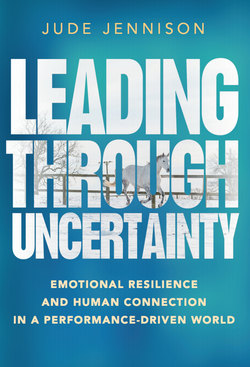Читать книгу Leading Through Uncertainty - Jude Jennison - Страница 7
На сайте Литреса книга снята с продажи.
ОглавлениеFOREWORD
Leading Through Uncertainty, Jude Jennison’s second book, provides a powerful narrative and account of the increasingly fast-paced, ever-changing environment of leadership. It guides and challenges us to adapt our behaviour as leaders and to learn new skills – essential if organisations are to thrive and have an engaged, fulfilled and productive workforce in the future.
Jude shares her wisdom, built up from having had a significant career in a major corporation, and aligns the conquering of her lifelong fear of horses with the challenge of building a successful business.
Jude draws on her up-to-date research with CEOs and her experience of working with leaders and teams in this book. Using her masterful and engaging storytelling style, she offers a practical guide and a valuable source of learning. The additional resources and papers extend this learning.
While many CEOs acknowledge they work with, are comfortable with and expect uncertainty in their roles, uncertainty does bring stress. It overwhelms, brings fear, and polarises. We are all familiar with the leadership mantra, ‘It is lonely at the top.’
This book guides us in the elements we need as leaders to make our teams feel safe and able to be productive, and to create structure and certainty out of chaos and confusion.
Huge advances in technology can help us if we correctly harness the power of the ability to process vast amounts of data. However, we all hear the cries of despair from people trying to manage and respond to hundreds of emails each day, while attempting to make sense and meaning from facts and figures presented in spreadsheets, databases, reports and apps. Jude highlights that we are not robots or machines but human beings whose contribution could be greater if allowed to slow down in order to speed up, which is a step towards managing the positive advances technology brings to our businesses.
We look to past data to help us predict the future, which is not really possible. Predicting trends, yes, but predicting the future is, of course, a skill we do not possess. If we are not acknowledging the difference as leaders, the level of uncertainty felt by us and our teams will soon pervade the organisations we lead. Tests are used to determine our character types. While such data is, indeed, useful, relying on it can inhibit your team’s personal development and deny the human capability to adapt and change our behaviour.
As human beings we have the capability to be innovative, to develop relationships and to collaborate, and for this we need space in which to think and reflect. The truth is that most organisations and leaders are still required to be results driven, with everyone being expected to act in direct conflict with our natural gifts and abilities; we are back to trying to be the computer rather than work with it!
Much effort and financial investment is spent on improving the performance of your team. Often, the complex emotions associated with being human are overlooked and people do not engage, leading, not surprisingly, to the investment making little or no contribution or change.
Every generation learns from the past. Already there are media- and research-driven labels given to the next generation of leaders, some less complimentary from the perspective of those on the receiving end of the naming conventions. It is my experience and hope that the next generation of leaders will simply not accept the outdated leadership styles of command and control, and of chasing results alone, and will set about building trusted relationships and managing reputation better than may be the norm at present.
In Leading Through Uncertainty Jude states that “it takes an exceptionally skilled leader to balance the energy of driving results with the softness of nurturing in complete harmony” and in this the gauntlet of challenge is cast. This is our call to action in all organisations.
When running highly respected horse-assisted leadership, team development programmes and coaching through her company Leaders by Nature, Jude is assisted by her team of five horses: Kalle, Opus, Tiffin, Mr Blue and Gio. I am sure you will feel connected to these wonderful animals by the end of the book and will learn how they can help develop the vital leadership skill of self-awareness.
Working with horses can indeed put many out of their comfort zone and lead us to see that as soon as we, as leaders, revert to control, we have ceased to trust ourselves and our teams. We are guided in considering how leaders can have a degree of certainty in an uncertain world and how the solid backbone of values that we fall back on in times of uncertainty is key to keeping on track. We learn how to not slip back to old, potentially destructive styles of leaderships in times of uncertainty.
My own experience with horse-facilitated leadership was profound and memorable. Whether we feel fear or vulnerability, it is essential that for the sake of our organisations, teams and personal wellbeing, we find a path towards calm and effective leadership.
As Jude Jennison says: We are human after all!
Gina Lodge, CEO, Academy of Executive Coaching (AoEC)
